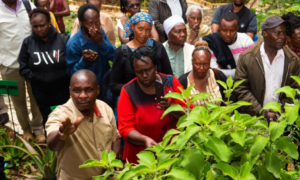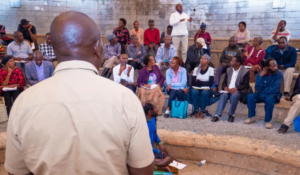Traditional Medicine in Kenya: Martin Odhiambo’s Adventures
Martin Odhiambo has spent years educating his fellow Kenyans about the medicinal benefits of plants, which have fascinated him for a long time. On Thursdays, he meets with dozens of people at the Nairobi National Museum’s theater to discuss and share knowledge about traditional medicine. Nearly 80% of the population in African countries still uses traditional medicine for illness treatment, according to the World Health Organization (WHO), despite doubts about the effectiveness and safety of these treatments.
Kenyan Traditional Medicine: Bridging the Divide
Government regulation, as is common in other nations, could alleviate some of the worries about the efficacy of traditional medicine in Kenya. But for the time being, Martin Odhiambo is committed to teaching people how to use plants to treat common illnesses, including the common cold, skin problems, and gastrointestinal problems. Prior to the development of modern medicine, traditional healers had a wealth of information on the use of plants to treat a wide range of illnesses, he says. While this knowledge is present within groups, it is rarely shared outside of them.
Tichah, an organization dedicated to Indigenous peoples’ health and culture, and the Physic Garden
Trust for Indigenous Culture and Health (Ticah) is an organization that has collaborated with the Nairobi National Museum to promote and conserve the cultural history of Kenya, and Martin Odhiambo works for them. He is in charge of the museum’s physics garden, which contains more than 250 different kinds of medicinal plants. The purpose of these plants is not to be sold but rather to educate people.

Plant Talks Every Week: A Treasure Chest of Information
Martin Odhiambo has devoted a great deal of time and energy to studying medicinal plants, drawing on both Western science and traditional indigenous wisdom. His unwavering commitment has bestowed upon him an almost innate knowledge of flora. Herbalists, an American midwife, a psychotherapist, a teacher, a college student, and a businesswoman are among the many people who listen to Odhiambo’s Weekly Plant Talks and benefit from his vast expertise.
A prayer and review of the previous week’s topics precede each session’s exploration of the featured plants. Lantana camara is one such plant; it goes by several names in the area, including “nyabende” and “mukige.” There is a traditional belief that this shrub helps alleviate toothaches and headaches and even serves as an insect repellent. Furthermore, its twigs are believed to emit positive energy and vibes, and they can also be used as toothbrushes.
The Exchange of Information and Cultural Backgrounds
In the course of the gatherings, people talk about several plant cures for different ailments. Traditional ceremonies, food preservation, and the magical abilities of these plants to bring goodwill to communities are some of the cultural contexts that they investigate. The purpose of this forum is to facilitate the exchange of information rather than to conduct scientific validation of the claims made.
Rules and Regulations Are Necessary
Because there is no official policy in Kenya that promotes the safe use of traditional medicine, it is not widely used. According to Vitalis Ochieng, Ticah’s senior program manager, Indigenous knowledge has the potential to underpin scientific inquiry. The author cites China as an example of a country that has successfully spread traditional medicine under the guise of “alternative medicine.” Ochieng is spearheading a long-awaited bill in Kenya that would standardize and regulate traditional drugs.

Traditional Medicine: Obstacles and Potentials
Kenyan traditional medicine has taken a major hit due to the rise of unlicensed “herbal clinics,” many of which provide low-quality treatments. Deputies at the Centre for Traditional Medicine Research (CTMDR), such as Dr. Ruth Nyangacha, have acknowledged problems such as product contamination and fraud. Patients with long-term health issues, such as diabetes, who frequently seek out less expensive and more easily accessible traditional therapies, may find this especially problematic.
Testimonials from Individuals and the Influence of Conventional Medicine
When traditional remedies for businesswoman Joyce Ng’ang’a’s chronic acid reflux did not work, she resorted to conventional medicine, having attended her first plant talk at the museum. Although there may be safety concerns, Ng’ang’a is hopeful that her pleasant experience would help bring traditional herbal remedies into the formal system.
Patrick Mwathi, a herbalist who often attends plant presentations, has studied the craft since the 1970s when he was a student under his father. He makes and sells herbal remedies in his hometown, one of which is a tea that claims to help with infertility as well as kidney and liver detoxification. Although there is a lack of scientific proof for these treatments, Mwathi has shown their effectiveness and safety by sending samples to government laboratories for chemical analysis. Nevertheless, quality control and product standardization add significant time and money to the product launch process.
The State’s Function and Its Prognosis
Dr. Nyangacha stresses the difficulties of knowing when medicines’ active ingredients will expire, saying that this is generally a matter of guesswork. Herbal treatments cannot be examined and licensed for conventional use due to a lack of funding at the CTMDR, which is a component of the Kenya Medical Research Institute (Kemri). In spite of these obstacles, Kemri has created its goods, such as a salt for hypertension and an herbal remedy for genital herpes, showing promise for the integration of traditional medicine into conventional healthcare.
Martin Odhiambo is still very much into plants, and he is doing all he can to prove to Kenyans that they can cure common diseases with natural treatments. His unwavering commitment to collecting and disseminating indigenous wisdom is evidence of the merit of traditional medicine and its ability to supplement modern medical treatment.


















